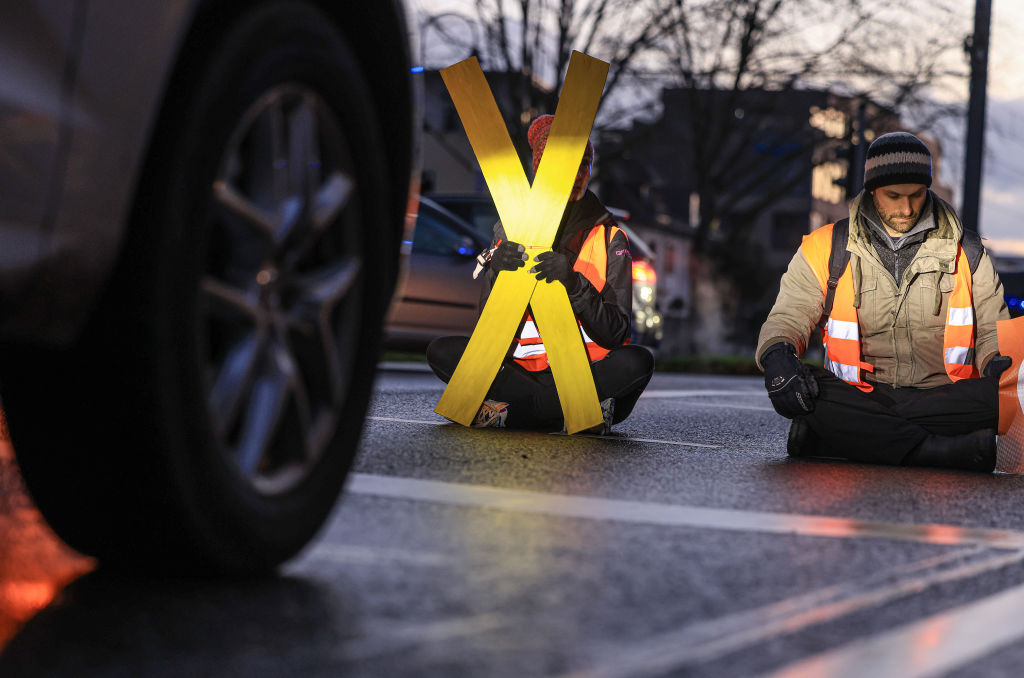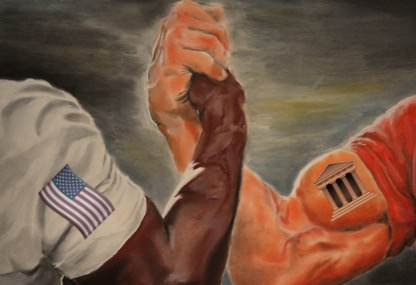Pacifist Warlords

Don’t be misled by peaceful protest.
On the opening day of Burning Man, an environmentalist group blocked off the road to the festival, causing traffic to back up as far as the eye could see. Because they were converging on tribal land, tribal police showed up, rammed through their barricade, brandished a gun, and handcuffed and removed the offenders. Their rapid and decisive action was stunning only because it seemed anachronistic in an age of excessive deference to protestors.
On their website the activists claimed that they embrace “peacefulness” and that their “words and actions are nonviolent.” Although the video they posted showed only a half dozen young people blocking the road in the Nevada desert, activists stated that their strategy is to “deploy mass turnout disruptive direct action” to advance their political goals.
Fair enough: the members of the organization don’t use weapons or throw punches. Thus they fancy themselves pacifists and civil libertarians in the model of Gandhi. But in fact they are a form of warlord, using the classic warlordist tactic of demanding tribute for free passage.
Environmentalists don’t have to look their victims in the eye and generally write off any damage they cause as a mere inconvenience. But trapping people in hot cars on a desert road causes very real suffering, restricts freedom of movement, and opens up the possibility of tragedy if first responders are unable to attend to an emergency.
The true significance of this type of political action goes beyond its immediate consequences. Because they bring about financial setbacks, misery, or perhaps even death, roadblocks make it impossible for ordinary citizens to conduct their affairs. Erect enough of them and civilization crumbles. Ironically, the Burning Man revelers who didn’t have it in them to get out of their campers and move the protesters experienced crisis on the way out of the festivals when the roads and the airport were closed because of flooding. Ultimately, the powers that can either facilitate or restrain the movement of goods and people control the country.
Environmentalists make no secret that their goal is to impose their will on our polity. It doesn’t matter if they use firearms or glue themselves to the asphalt to achieve this end—theirs is an act of dominance. Living in a modern Western society, they derive their power not from brute force but from performative righteous helplessness. Remove them by force and they’ll decry brutality. But unelected activists don’t deserve to assert their will over citizenry simply because they abhor guns. Nowhere in our Constitution does it say that a party is entitled to oppress American citizens as long as it stays non-violent.
Radicals themselves argue that their mandate comes not from institutions of our free republic but the virtuousness of their cause. “Climate emergency” is such a pressing issue that they have no time to consult the demos. When ISIS obstructs freedom of movement with guns, they do it for Allah; Islamists might have a more neatly-contained argument, but the power and faith dynamics are the same in both cases.
As the saying goes, environmentalists are like watermelons, green on the outside, red on the inside. Greenpeace co-founder Patrick Moore, for instance, dropped out of the organization after it was highjacked by the Left, which replaced responsible preservation with nature-centered rhetoric crafted to advance its political goals.
Today’s tree huggers are schooled in the intersectional agenda of which the “planetary emergency” is but a single, if very convenient, part. Full-time activists who run environmentalist and other far-left organizations understand the dynamics of an insurgency. For all we know, they might be cynical about the climate, but they know how revolutions are made.
Erecting roadblocks is the go-to tactic of activists around the globe. In the last months, for instance, the Left have converged on the streets of Israeli cities, blocking freeways without permits. Although the demonstrations are often described as a spontaneous peaceful reaction against judicial reforms, the leaders admit they were pre-planned and financed from abroad. Observers call them a color revolution, or a coup. So far, the Netanyahu government is firmly in place, and no shots have been fired, even if the prime minister’s private residence has been briefly put under siege and his wife found herself accosted by protesters at a hair salon.
In 2014 in Ukraine, what started as a demonstration against a trade agreement with Russia with barricades erected in the main square in Kiev, quickly escalated into takeover of government buildings. Then-President Viktor Yanukovich was forced to flee and a new government was installed. I hear there were some vegetarian pacifists in the vicinity, but these barricades on Maidan weren’t erected for peaceful purposes, and those storming the government buildings waved the red and black banners of the World War II-era Ukrainian fascists.
Not all American warlordism is non-violent, either. Antifa and Black Lives Matter are also known to block roads. For a few months in 2020, Antifa barricaded several blocks in downtown Seattle, attempting to turn it into a no-cops allowed flower-power revival zone. The mayor refused to disperse the intruders and, in a blink of an eye, the area turned into a criminal wasteland.
Both Antifa and BLM are notorious for acts of violence like arson, assault, and murder. They support environmental justice causes, just as environmentalist activists are in favor of social and racial justice. They consider themselves part of a single intersectional Left movement.
Non-violence is not a principled position of those who condemn all brute force. It’s more of a way for an applicant to narrow down the job search criteria—the radicals uncomfortable with the use of raw physical power leave it to their comrades. Some block roads with their bodies—which always makes for good photos—while others destroy monuments, burn churches, and storm embassies.
Although insurgent movements are helped by violence, violence is not always necessary to subvert the democratic process or constitutional structure and to impose one’s will upon a people. Our civilization relies on a democratic sovereign imposing order and protecting the life and liberty of ordinary citizens. Law enforcement must go after those who try to usurp that power from the state. The punishment for erecting roadblocks or otherwise restricting our freedom of movement should be such that any individual interested in taking this type of action would think twice. The tribal cops in Nevada are setting a good example for us all.
The American Mind presents a range of perspectives. Views are writers’ own and do not necessarily represent those of The Claremont Institute.
The American Mind is a publication of the Claremont Institute, a non-profit 501(c)(3) organization, dedicated to restoring the principles of the American Founding to their rightful, preeminent authority in our national life. Interested in supporting our work? Gifts to the Claremont Institute are tax-deductible.






